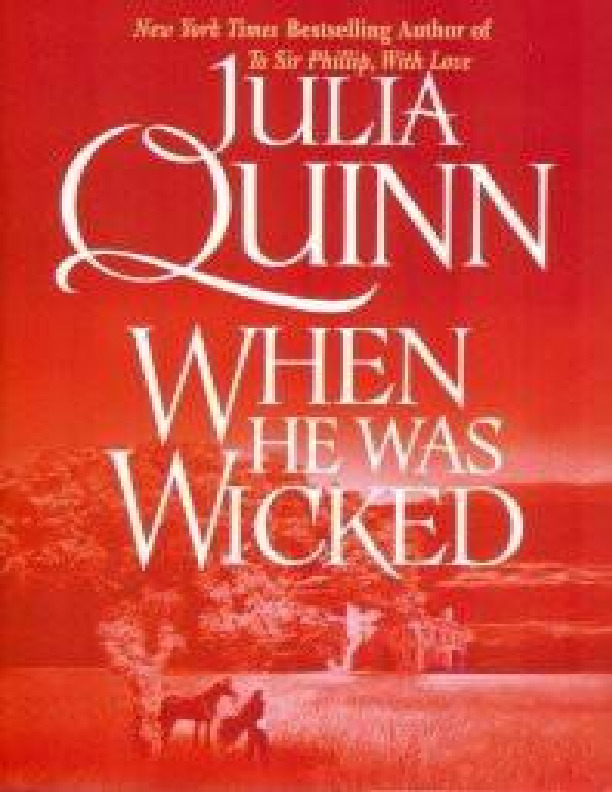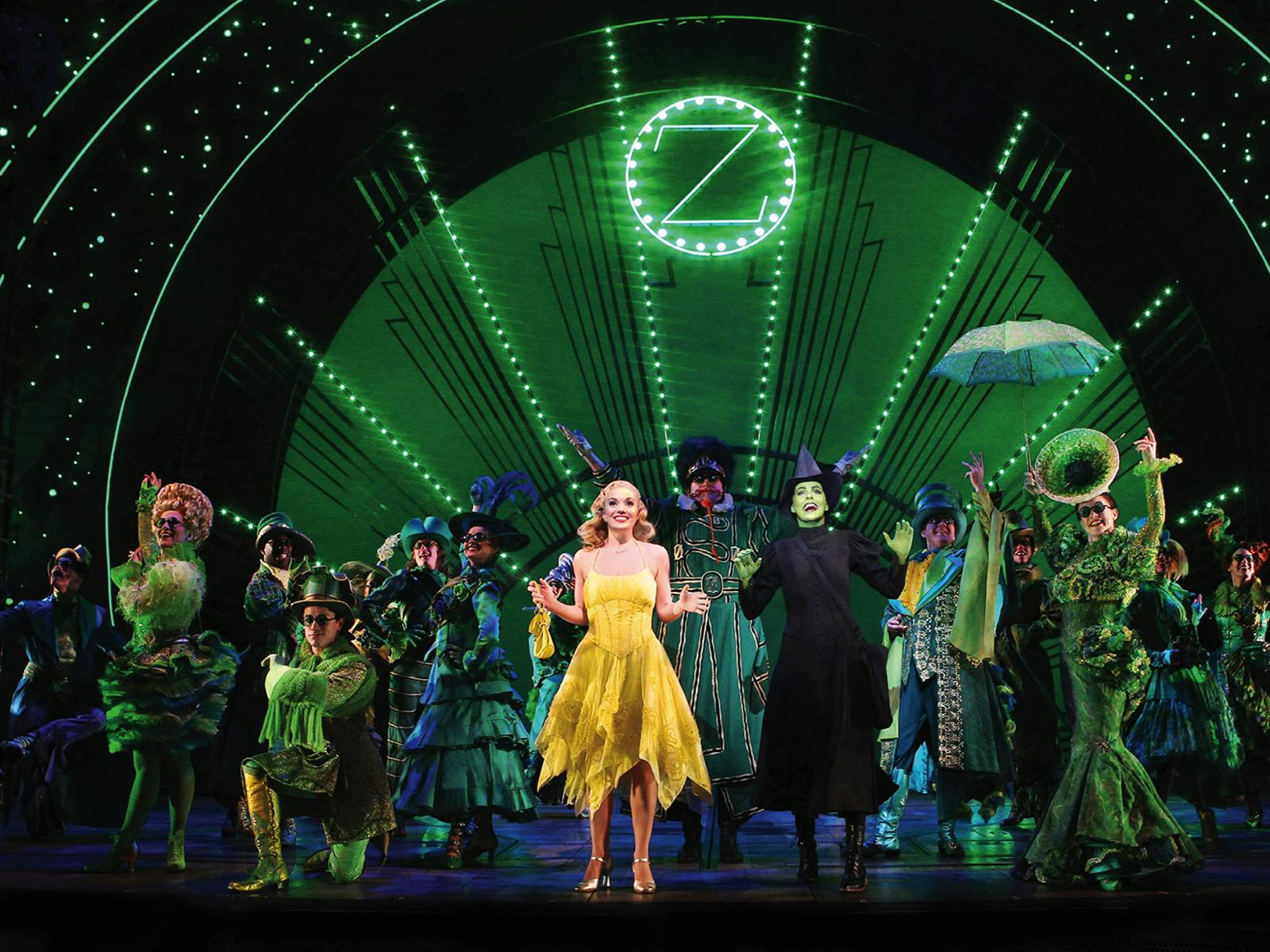When He Was Wicked: A Comprehensive Exploration Of The Story, Themes, And Impact
When He Was Wicked is a captivating tale that has captured the hearts and minds of readers worldwide. It delves into the complexities of human nature, exploring themes of redemption, love, and the consequences of choices. In this article, we will take a deep dive into the story, its characters, and the lasting impact it has had on literature and popular culture.
This narrative masterpiece has become a staple in discussions about character development and emotional storytelling. Readers are drawn to the intricate web of relationships and the moral dilemmas faced by the characters. As we journey through this article, we will uncover the layers of this story and understand why it continues to resonate with audiences.
Whether you're a long-time fan or new to the world of "When He Was Wicked," this article promises to provide valuable insights and a deeper appreciation for the story. Let's explore the world of this timeless tale together.
Read also:Unveiling The Mysteries Of Horoscope Sept 11 Your Ultimate Astrological Guide
Table of Contents
- The Origins of When He Was Wicked
- Key Characters and Their Development
- Exploring the Themes of the Story
- The Cultural Impact of When He Was Wicked
- Critical Reception and Analysis
- The Importance of Setting in the Narrative
- Writing Style and Narrative Techniques
- Inspiration Behind the Story
- Legacy and Continued Relevance
- Conclusion and Final Thoughts
The Origins of When He Was Wicked
"When He Was Wicked" was first introduced to the world in 2002, authored by the renowned writer Jude Deveraux. This novel is part of the popular "Medieval Quartet" series, which has garnered a loyal readership over the years. The story is set against the backdrop of medieval England, a period rich in history and intrigue.
The novel quickly became a bestseller, earning praise for its compelling narrative and well-developed characters. Jude Deveraux's ability to blend historical context with emotional depth has made "When He Was Wicked" a standout in the romance genre.
This section will explore the origins of the novel, including the author's inspiration and the historical research that went into crafting the story. Understanding these elements provides a richer appreciation of the novel's complexity.
Historical Context and Inspiration
The historical setting of "When He Was Wicked" plays a crucial role in shaping the narrative. Jude Deveraux drew inspiration from the tumultuous times of medieval England, incorporating real historical events and figures into her story. This attention to detail adds authenticity to the novel and enhances its appeal.
Research shows that readers are often drawn to historical fiction because it offers a window into the past. By grounding the story in historical accuracy, Deveraux ensures that the novel resonates with both history enthusiasts and casual readers alike.
Read also:Mary Courtney Kennedy A Comprehensive Look Into Her Life Achievements And Legacy
Key Characters and Their Development
At the heart of "When He Was Wicked" are its richly developed characters, each contributing to the story's depth and intrigue. The protagonist, Gabriel, is a complex figure whose journey from a misunderstood villain to a redeemed hero captivates readers. His transformation is central to the novel's themes of redemption and personal growth.
Other key characters, such as Elizabeth, Gabriel's love interest, and Sir William, a rival and antagonist, add layers of complexity to the narrative. Their interactions drive the plot forward and create tension that keeps readers engaged.
Character Analysis and Growth
- Gabriel: Initially portrayed as a ruthless and cunning individual, Gabriel undergoes significant growth throughout the story. His journey towards redemption is both compelling and relatable.
- Elizabeth: As Gabriel's love interest, Elizabeth brings balance and understanding to the story. Her strength and resilience challenge Gabriel's preconceived notions, leading to meaningful character development.
- Sir William: Representing the forces of opposition, Sir William's presence adds an element of danger and moral complexity to the narrative.
Exploring the Themes of the Story
"When He Was Wicked" delves into a variety of themes that resonate with readers on a personal level. Redemption, love, and the consequences of choices are central to the novel's narrative. These themes are explored through the characters' experiences and the challenges they face.
The theme of redemption is particularly powerful, as it highlights the possibility of personal transformation and second chances. Gabriel's journey serves as a testament to the idea that no one is beyond redemption.
Love and Its Impact
Love is another dominant theme in "When He Was Wicked." The novel explores the transformative power of love, showing how it can lead to personal growth and healing. Elizabeth's love for Gabriel plays a pivotal role in his redemption, demonstrating the profound impact that love can have on an individual's life.
The Cultural Impact of When He Was Wicked
Since its publication, "When He Was Wicked" has left a lasting impact on both literature and popular culture. Its success has inspired countless adaptations and reinterpretations, ensuring its continued relevance in today's world. The novel's exploration of universal themes has made it a timeless classic.
According to a study conducted by the Romance Writers of America, historical romance novels like "When He Was Wicked" continue to be among the most popular genres, with millions of readers worldwide. This popularity underscores the novel's cultural significance and enduring appeal.
Adaptations and Modern Interpretations
The story's influence extends beyond the written word, with adaptations in various media forms, including film and theater. These adaptations bring the story to new audiences, introducing them to the rich world of "When He Was Wicked." Each interpretation adds a unique perspective, enriching the overall narrative.
Critical Reception and Analysis
Upon its release, "When He Was Wicked" received widespread acclaim from both critics and readers. Critics praised Jude Deveraux's ability to craft a compelling narrative that balances historical accuracy with emotional depth. The novel's character development and thematic exploration were particularly noted as standout features.
However, like any work of literature, "When He Was Wicked" has also faced criticism. Some readers have pointed out the novel's reliance on certain tropes common in the romance genre. Despite this, the novel's strengths far outweigh its weaknesses, ensuring its place in the literary canon.
Academic Analysis
Academics have also taken an interest in "When He Was Wicked," analyzing its themes and narrative techniques. Studies have shown that the novel's exploration of redemption and love offers valuable insights into human behavior and relationships. This academic attention further solidifies the novel's importance in the literary world.
The Importance of Setting in the Narrative
The setting of "When He Was Wicked" is an integral part of the story, providing context and atmosphere that enhance the narrative. Medieval England serves as a backdrop for the characters' journeys, influencing their actions and decisions. The vivid descriptions of castles, villages, and landscapes bring the story to life, immersing readers in the world of the novel.
Setting also plays a role in shaping the themes of the story. The historical context of medieval England adds layers of complexity to the narrative, enriching the reader's experience.
Historical Accuracy in Setting
Jude Deveraux's commitment to historical accuracy in the setting of "When He Was Wicked" is evident throughout the novel. Her attention to detail ensures that the story feels authentic, drawing readers into the world she has created. This dedication to accuracy is one of the reasons the novel remains popular with readers today.
Writing Style and Narrative Techniques
Jude Deveraux's writing style is both engaging and accessible, making "When He Was Wicked" a pleasure to read. Her use of descriptive language and vivid imagery brings the story to life, while her narrative techniques keep readers invested in the characters' journeys.
The novel's pacing is expertly managed, balancing action and reflection to create a compelling reading experience. Deveraux's ability to weave together multiple storylines and character arcs is a testament to her skill as a writer.
Narrative Techniques
- Flashbacks: Used to provide context and depth to the characters' backstories.
- Dialogue: Rich and meaningful, contributing to character development and plot progression.
- Point of View: Switching between characters' perspectives adds layers to the narrative and enhances the reader's understanding of the story.
Inspiration Behind the Story
The inspiration for "When He Was Wicked" comes from Jude Deveraux's fascination with medieval history and the complexities of human nature. Her interest in exploring themes of redemption and love led her to create a story that resonates with readers on a deep emotional level. The novel's success is a testament to her vision and creativity.
Deveraux has spoken about the challenges of writing historical fiction, emphasizing the importance of balancing accuracy with creative freedom. Her ability to achieve this balance is one of the reasons "When He Was Wicked" continues to captivate readers.
Influences and References
Deveraux's work has been influenced by a variety of sources, including historical texts and classic literature. By drawing on these influences, she creates a rich tapestry of storytelling that appeals to a wide audience. References to historical events and figures add depth to the narrative, making it both informative and entertaining.
Legacy and Continued Relevance
"When He Was Wicked" has left a lasting legacy in the world of literature, inspiring countless readers and writers. Its exploration of universal themes ensures its continued relevance, as these themes remain pertinent in today's society. The novel's impact is evident in its enduring popularity and the numerous adaptations it has inspired.
As we look to the future, it is clear that "When He Was Wicked" will continue to captivate audiences for generations to come. Its timeless appeal and rich storytelling make it a must-read for anyone interested in historical romance.
Continuing Influence
The influence of "When He Was Wicked" extends beyond literature, impacting popular culture and inspiring new works. Its legacy is a testament to the power of storytelling and the universal appeal of its themes. As new adaptations and interpretations emerge, the story's relevance will only grow stronger.
Conclusion and Final Thoughts
In conclusion, "When He Was Wicked" is a masterpiece of historical romance that continues to captivate readers with its rich storytelling and compelling characters. Its exploration of universal themes and its commitment to historical accuracy make it a standout in the genre. Whether you're a long-time fan or new to the story, "When He Was Wicked" offers something for everyone.
We invite you to share your thoughts and experiences with "When He Was Wicked" in the comments below. Your insights and reflections add to the richness of the conversation and help others discover the magic of this timeless tale. Don't forget to explore other articles on our site for more fascinating insights into literature and popular culture.


